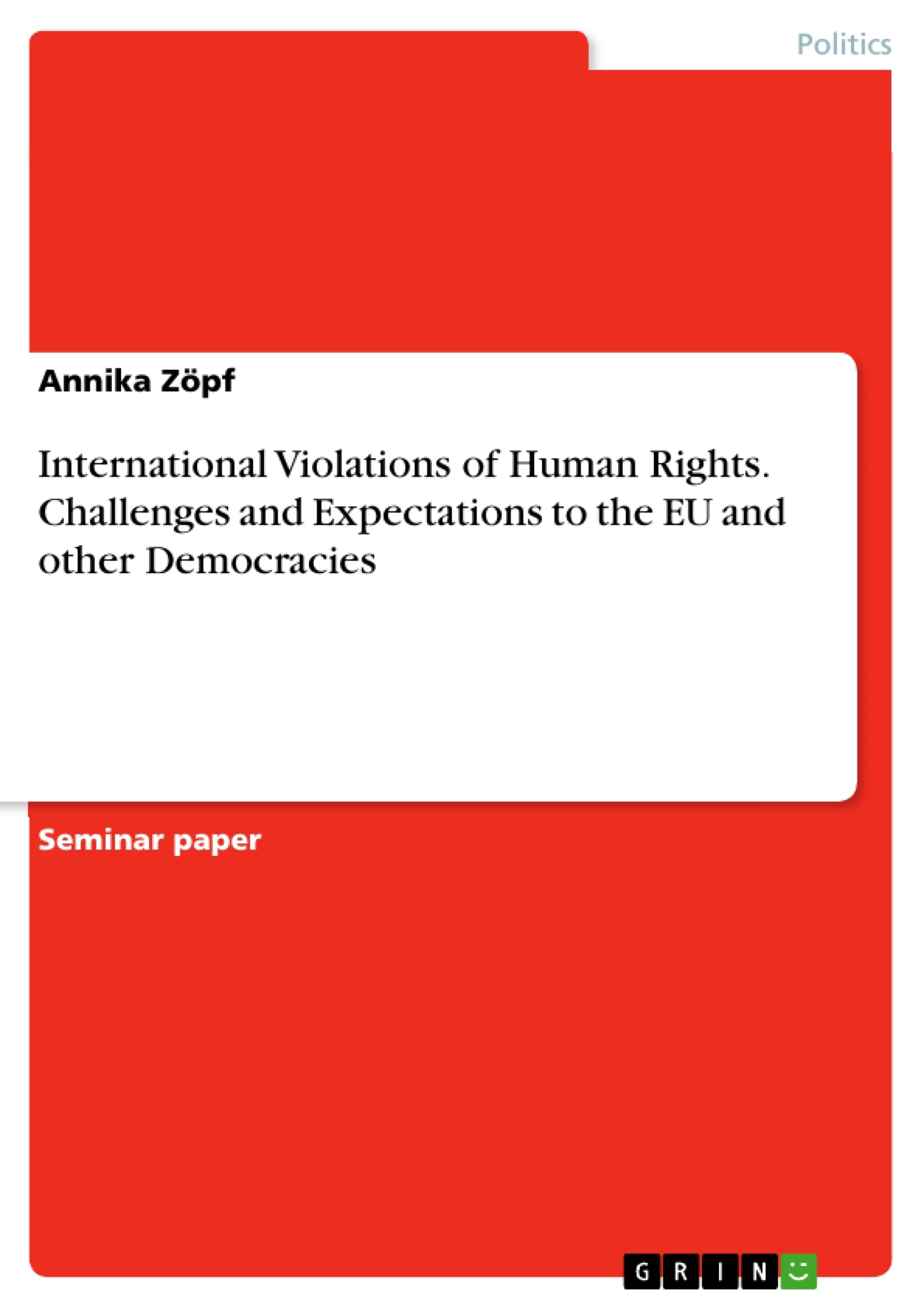Over the course of recent years cases of open violation of human rights by autocratic regimes worldwide, even to the degree of doing so abroad, as we see with cases of transnational repressions, have become more frequent. Thus, dealing with these violations as well as their consequences have become one of the biggest challenges that democratic states, especially the European Union, have to face today. But what are democratic governments to do, and what even can they do, when faced with such acts? To find answers to this question this paper examines different aspects of the topic how the European Union has dealt and is still dealing with this challenge and a discussion on the future course of action against such violations as well as a general outlook on the topic .
Inhaltsverzeichnis (Table of Contents)
- Introduction
- International Violations of Human Rights
- Transnational Repression
- Expectations to and Actions Taken by Democracies
- Case Study South Africa
- Case Study Belarus
- 2004-2016
- 2016-2021 and Future Prospects
- Discussion
Zielsetzung und Themenschwerpunkte (Objectives and Key Themes)
This paper aims to examine how the European Union has dealt with and continues to address the challenge of international human rights violations. It explores the concept of transnational repression as a specific type of human rights violation, focusing on its implications for democratic states, particularly the EU. The paper further examines the expectations and real possibilities democratic governments face in responding to such repressions.
- International human rights violations and their evolution
- The rise and impact of transnational repression
- The EU's role in upholding human rights globally
- The challenges and possibilities for democracies in responding to transnational repression
- Case studies of South Africa and Belarus, highlighting contrasting approaches to human rights
Zusammenfassung der Kapitel (Chapter Summaries)
The paper begins by introducing the concept of human rights, tracing its development from the Universal Declaration of Human Rights (UDHR) in 1948. It highlights the ongoing violations of these rights, even by member states, and the increasing prevalence of repressive tactics, particularly transnational repression.
Chapter 2 delves into the specifics of transnational repression, defining the concept as a strategy employed by governments to silence dissent within their diaspora and exiled communities. It provides evidence of how this practice has become institutionalized across numerous regimes.
Chapter 3 focuses on the expectations and actions taken by democratic governments, especially the EU, when confronted with transnational repression. It examines the specific challenges faced and analyzes the possibilities for effective action.
Chapters 4 and 5 present case studies of South Africa and Belarus, respectively. The South African case study analyzes the apartheid policy and its eventual abolition, while the Belarus case study examines the repressive reign of Alexander Lukashenko and the recent transgressions, including the Roman Protasevich case.
The paper concludes with a discussion on future courses of action against human rights violations and provides a general outlook on the subject.
Schlüsselwörter (Keywords)
The main keywords and focus topics of the paper include human rights, transnational repression, EU, democracy, autocracy, diaspora, exiled communities, expectations, actions, case studies, South Africa, Belarus, apartheid, Lukashenko, Roman Protasevich.
Frequently Asked Questions
What is transnational repression?
Transnational repression is a strategy used by autocratic regimes to silence, harass, or threaten dissenters and exiled communities living abroad.
How is the EU responding to international human rights violations?
The EU faces the challenge of balancing diplomatic relations with the enforcement of human rights, employing various political and economic tools to address repressions.
What role does the diaspora play in these human rights issues?
Diasporas and exiled communities are often the primary targets of transnational repression, as regimes seek to control their influence and prevent opposition from abroad.
What happened in the Roman Protasevich case in Belarus?
The case involved the forced diversion of a commercial flight to arrest a dissident journalist, serving as a prime example of institutionalized transnational repression by the Lukashenko regime.
How does the South African case study relate to modern human rights?
The analysis of apartheid in South Africa provides historical context on how international pressure and democratic expectations can lead to the abolition of repressive systems.
- Arbeit zitieren
- Annika Zöpf (Autor:in), 2021, International Violations of Human Rights. Challenges and Expectations to the EU and other Democracies, München, GRIN Verlag, https://www.grin.com/document/1184931



